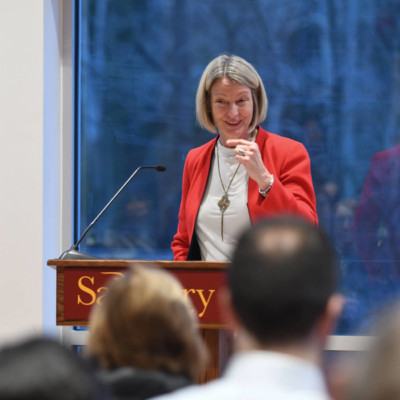The Center for Civic Reflection is a program of the Institute for Public Affairs and Civic Engagement at Salisbury University (PACE). The Center formally moved to Salisbury University in the fall of 2018.
Under PACE, the Center continues its mission of promoting thoughtful conversations around the United States, while adding specific commitments to extend the evaluation of civic reflection and integrate civic reflection in educational experiences across the K-16 spectrum.
The Center for Civic Reflection began as the Project on Civic Reflection in 1998 at Valparaiso University, with support from Lilly Endowment, Inc. Working together on other efforts, founder Elizabeth Lynn and Lilly Endowment evaluation director Susan Wisely had noticed that–despite increased talk about the importance of service and philanthropy in American life–people involved in common civic work were rarely encouraged to think deeply together about their underlying values, commitments and questions.
Lynn and Wisely wondered whether the practice of text-based discussion, so central both to the liberal arts and to religious life, might help create the needed space for reflection and conversation in civic life as well. Wonder led the way to experimentation, first in northwest Indiana and then on a national scale.
Experimentation accompanied by careful evaluation gradually yielded expertise, and in time the Project on Civic Reflection became the Center for Civic Reflection, a distinctive national resource equipped to help people foster meaningful civic conversation in their own places and ways.
Since its inception, the Center for Civic Reflection has fostered the practice of reflective discussion with many different groups and organizations, including Rotary Clubs, AmeriCorps programs, nonprofit boards, high school and college teachers and students, giving circles, healthcare providers, and more. These reflective discussions start from objects such as texts, images and videos to help people consider the beliefs and values that underlie their commitments, impact their communities and shape their work and action in the world.

In order to help spread the practice, CCR has trained several thousand discussion facilitators across the world who have gone on to lead reflective dialogue with tens of thousands of people. CCR has also trained a diverse cadre of trainers who lead workshops and model discussions in a wide range of communities and organizational settings. Since 1998 CCR has worked in 42 states and welcomed international participants from places like Singapore, Guam and Jamaica.
Both the practice of civic reflection and the Center itself evolved over time through the collective creative endeavor of many people, including Craig Dykstra, Amy Kass, Mark Schwehn, Deedee Schwartz, Esther Mackintosh, Mary Kennedy, Erik Jorgensen, Susie Quern Pratt, Kelli Covey, Catherine Tufariello, Jeff Weissglass, Thomas Toney and others too numerous to mention. We are grateful to everyone who helped develop the practice, the web site, and the Center, and especially to Adam Davis, whose expert practice and effort brought this work to a new level and made it the powerful practice it is today.
